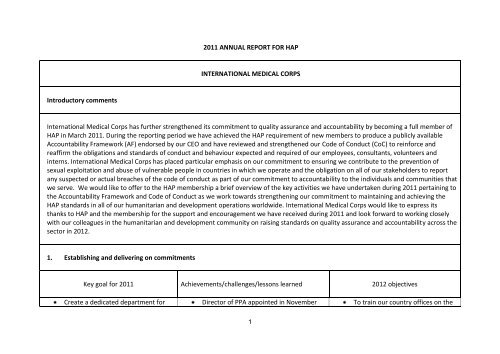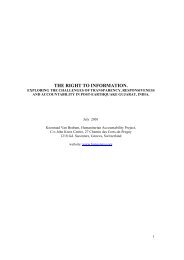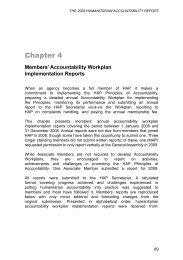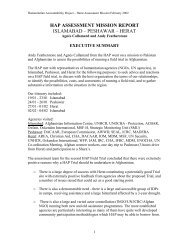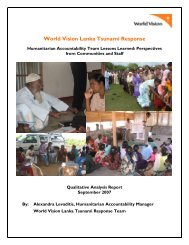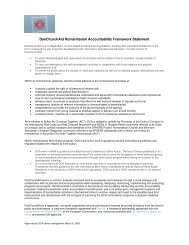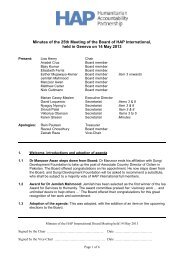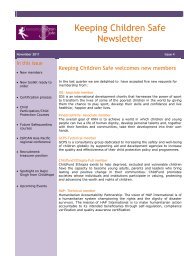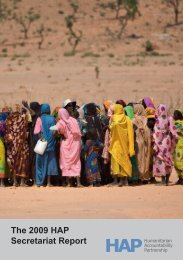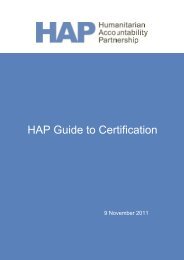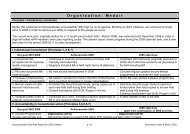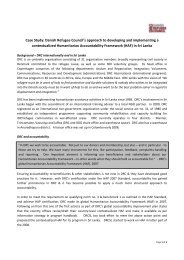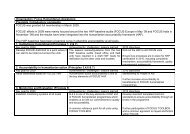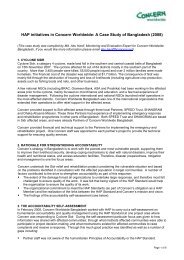International Medical Corps - HAP International
International Medical Corps - HAP International
International Medical Corps - HAP International
You also want an ePaper? Increase the reach of your titles
YUMPU automatically turns print PDFs into web optimized ePapers that Google loves.
2011 ANNUAL REPORT FOR <strong>HAP</strong><br />
INTERNATIONAL MEDICAL CORPS<br />
Introductory comments<br />
<strong>International</strong> <strong>Medical</strong> <strong>Corps</strong> has further strengthened its commitment to quality assurance and accountability by becoming a full member of<br />
<strong>HAP</strong> in March 2011. During the reporting period we have achieved the <strong>HAP</strong> requirement of new members to produce a publicly available<br />
Accountability Framework (AF) endorsed by our CEO and have reviewed and strengthened our Code of Conduct (CoC) to reinforce and<br />
reaffirm the obligations and standards of conduct and behaviour expected and required of our employees, consultants, volunteers and<br />
interns. <strong>International</strong> <strong>Medical</strong> <strong>Corps</strong> has placed particular emphasis on our commitment to ensuring we contribute to the prevention of<br />
sexual exploitation and abuse of vulnerable people in countries in which we operate and the obligation on all of our stakeholders to report<br />
any suspected or actual breaches of the code of conduct as part of our commitment to accountability to the individuals and communities that<br />
we serve. We would like to offer to the <strong>HAP</strong> membership a brief overview of the key activities we have undertaken during 2011 pertaining to<br />
the Accountability Framework and Code of Conduct as we work towards strengthening our commitment to maintaining and achieving the<br />
<strong>HAP</strong> standards in all of our humanitarian and development operations worldwide. <strong>International</strong> <strong>Medical</strong> <strong>Corps</strong> would like to express its<br />
thanks to <strong>HAP</strong> and the membership for the support and encouragement we have received during 2011 and look forward to working closely<br />
with our colleagues in the humanitarian and development community on raising standards on quality assurance and accountability across the<br />
sector in 2012.<br />
1. Establishing and delivering on commitments<br />
Key goal for 2011 Achievements/challenges/lessons learned 2012 objectives<br />
Create a dedicated department for Director of PPA appointed in November To train our country offices on the<br />
1
program performance and<br />
accountability (PPA)<br />
Apply to <strong>HAP</strong> for full membership<br />
Conduct a self-assessment baseline<br />
survey against the <strong>HAP</strong> standard 2010<br />
Devise and adopt an organizational<br />
accountability framework endorsed<br />
by the CEO and senior management.<br />
2. Staff competency<br />
2010 and department created with<br />
subsequent appointment of a dedicated<br />
PPA officer.<br />
Full membership approved by the <strong>HAP</strong><br />
Secretariat in March 2011<br />
Baseline self-assessment survey<br />
conducted against the <strong>HAP</strong> standard 2010<br />
completed in June 2011<br />
Consultation exercise with stakeholders<br />
completed and the organizational<br />
accountability framework formally<br />
endorsed and adopted by <strong>International</strong><br />
<strong>Medical</strong> <strong>Corps</strong>’ CEO<br />
A key lesson learned during our first year<br />
of membership is the importance of senior<br />
management regularly reinforcing to all<br />
staff that the <strong>HAP</strong> process is seen as an<br />
organizational priority and that all<br />
departments need to be involved in the<br />
development and implementation of the<br />
Accountability Framework in order for it<br />
to be understood, supported and<br />
progressed organization wide.<br />
development and implementation<br />
of a national level accountability<br />
framework appropriate to each<br />
context of operation and to provide<br />
tools and resources to enable them<br />
to conduct a baseline selfassessment<br />
against the <strong>HAP</strong><br />
standards 2010<br />
To dedicate further resources to<br />
the <strong>HAP</strong> process within available<br />
budget parameters<br />
Key goal for 2011 Achievements/challenges/lessons learned 2012 objectives<br />
To make all IMC employees aware of A series of briefings and awareness raising Learning modules to be developed<br />
2
the <strong>HAP</strong> initiative and that<br />
accountability and quality assurance<br />
initiatives are organizational priorities<br />
Review the <strong>International</strong> <strong>Medical</strong><br />
<strong>Corps</strong> Code of Conduct to ensure it<br />
meets the <strong>HAP</strong> standard 2010 and<br />
provide refresher training for staff on<br />
their obligations under the Code of<br />
Conduct with special attention to the<br />
understanding of prevention of<br />
sexual exploitation and abuse in our<br />
countries of operation<br />
3. Sharing information<br />
sessions were held for all staff in IMC HQ<br />
locations in Los Angeles, Washington DC,<br />
London, and Split outlining the <strong>HAP</strong><br />
process and the development of the<br />
Accountability Framework<br />
The <strong>HAP</strong> initiative was a key topic at IMC<br />
Regional Conferences as part of further<br />
awareness raising of the <strong>HAP</strong> process<br />
During 2011, 1,858 staff, interns,<br />
volunteers and consultants received<br />
training and awareness raising sessions in<br />
HQ locations and countries of operation<br />
on the Code of Conduct and how they can<br />
contribute to the prevention of sexual<br />
exploitation and abuse of vulnerable<br />
people in developing countries and the<br />
responsibility of all to report suspected<br />
breaches of the code of conduct<br />
A Learning and development working<br />
group was established with dedicated<br />
staff assigned to identifying how the <strong>HAP</strong><br />
components could be incorporated into all<br />
IMC learning and development<br />
opportunities for staff members as we go<br />
forward<br />
for integrated training on the code<br />
of conduct, PSEA, Ethics Point,<br />
Child Protection Policy etc. and<br />
strengthening of<br />
induction/orientation training for<br />
all new employees in this regard<br />
Integration of staff development<br />
goal setting on accountability as<br />
part of annual performance<br />
evaluation<br />
Initial and refresher training to be<br />
conducted in country and field<br />
office locations (SEA, child<br />
protection, EthicsPoint, Code of<br />
Conduct)<br />
Key goal for 2011 Achievements/challenges/lessons learned 2012 objectives<br />
3
Make the Accountability Framework<br />
and Code of Conduct publicly<br />
available<br />
4. Participation<br />
The Accountability Framework and Code<br />
of Conduct were made publicly available<br />
on our websites<br />
Dedicated intranet site created for<br />
program performance and accountability<br />
providing a central resource for colleagues<br />
on key accountability and quality<br />
assurance materials<br />
To rollout an IMC guide for country<br />
offices on best practice in sharing<br />
information for our stakeholders in<br />
each country of operation<br />
Posting of executive summaries of<br />
evaluations of IMC programs on<br />
our websites on a dedicated page<br />
for quality and accountability<br />
Country office reporting<br />
mechanism put in place so that HQ<br />
can monitor and support the<br />
creation and dissemination of<br />
information products made widely<br />
available to stakeholders<br />
Key goal for 2011 Achievements/challenges/lessons learned 2012 objectives<br />
Conduct wide ranging consultation<br />
exercise with our stakeholders as part<br />
of the baseline self-assessment<br />
against the <strong>HAP</strong> standards 2010 and<br />
development of the Accountability<br />
Framework<br />
A cross section of IMC HQ and country<br />
office staff both international and<br />
national, donor representatives, NGO<br />
counterparts, beneficiary<br />
representative groups in Haiti, Kenya<br />
and Tunisia and <strong>HAP</strong> colleagues were<br />
consulted in the development of the<br />
Accountability Framework<br />
A key lesson learned was the<br />
To provide training, tools and<br />
materials to country offices to enable<br />
and empower them to strengthen<br />
their engagement with stakeholders<br />
and most importantly beneficiary<br />
representative groups in the design,<br />
monitoring and evaluation of IMC<br />
programs<br />
4
importance of encouraging<br />
participation from a wide spectrum of<br />
stakeholders to develop an<br />
Accountability Framework that has the<br />
support and contributions of as many<br />
interested parties as possible within<br />
available resources.<br />
5. Handling complaints<br />
Key goal for 2011 Achievements/challenges/lessons learned 2012 objectives<br />
Review internal systems and<br />
procedures for receiving, handling<br />
and responding to feedback and<br />
complaints from stakeholders and<br />
strengthen existing feedback and<br />
complaint procedures to include the<br />
availability of Ethics Point for all<br />
field offices<br />
6. Learning and continual improvement<br />
Review of systems and procedures<br />
completed and recommendations made<br />
to HR department to strengthen<br />
transparency and accountability in this<br />
regard.<br />
Ethics Point to be launched and<br />
utilised by country offices and HQ<br />
locations worldwide<br />
Adoption and roll-out of IMC General<br />
Complaint Policy and staff field<br />
handbook to guide its implementation<br />
Development of minimum<br />
requirement checklist for field<br />
complaint systems<br />
Training at Country Office level for 4<br />
pilot countries to establish/document<br />
local level complaint systems and<br />
ensure integration within general<br />
complaint policy<br />
5
Key goal for 2011 Achievements/challenges/lessons learned 2012 objectives<br />
Review current approach to<br />
monitoring and evaluation and<br />
identify ways to strengthen our<br />
existing approach.<br />
Establish working groups comprising<br />
a cross section of HQ staff to look at<br />
staff wellbeing, training needs on<br />
staff development and decision<br />
making and accountability<br />
Recruit further specialist staff to<br />
enhance the Health Technical Unit<br />
with particular focus on monitoring<br />
and evaluation<br />
Health Technical Unit significantly<br />
enhanced and specialist staff recruited<br />
to further strengthen our monitoring<br />
and evaluation capacity and support to<br />
country offices<br />
A key lesson learned was the recognition<br />
that IMC needs to develop an evaluation<br />
policy to strengthen our ability to learn<br />
from experience and strive for<br />
continuous improvement in everything<br />
we do<br />
Develop and adopt an evaluation<br />
policy to ensure greater predictability<br />
and consistency in learning from<br />
experience to feedback into best<br />
practice both for IMC internal<br />
purposes and to contribute to<br />
learning and improvement for the<br />
humanitarian and development<br />
sectors generally<br />
6


